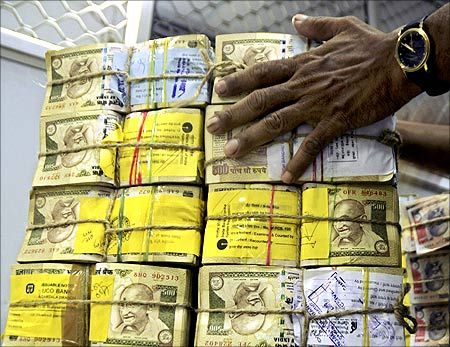 Investment bankers are advising their multinational clients to increase stake in their Indian subsidiaries or go for more mergers and acquisitions (M&As) to take advantage of the falling rupee.
Investment bankers are advising their multinational clients to increase stake in their Indian subsidiaries or go for more mergers and acquisitions (M&As) to take advantage of the falling rupee.
Some investment bankers expect the Indian currency to touch 60-65 a dollar by the end of the year.
“The rupee has come down by close to 30 per cent, the most among all Asian currencies, in the last two years against the dollar. This is the right time for multi-national companies (MNCs) to either raise stake in their Indian companies or look at M&A opportunities, as the cost of potential transactions is now already cheaper by 30 per cent as compared to two years ago,” said a banker.
While many MNCs such as Unilever, GSK Consumer and Standard & Poor’s have already announced their intention to raise stake in their Indian subsidiaries, others are weighing options, the banker added.
“The rupee fall versus the dollar is good news for MNCs looking at investing in India. A lot of MNCs want to increase their stake in Indian arms and are looking at M&A opportunities. One can expect some open offers in the coming days,” said a banker.
According to a Bank of America report, some of the top contenders for open offers are Maruti Suzuki, ACC-Ambuja Cements, GSK Pharma, Nestle
A number of Indian companies are in talks with foreign firms for a possible M&A. The potential transactions include sale of stake in Reliance Communications to South Africa’s MTN, Tata Teleservices’ stake sale to Telenor of Norway and sale of Indian operations by Aircel.
“For most of these MNCs, buying a company in India makes sense, as they will have to spend less in dollars due to a falling rupee,” said a banker, asking not to be named as he is advising one of the parties on a transaction.
An M&A advisor said: “As of now, foreigners are more bullish on India than Indians themselves. So, we can expect some big-ticket transactions in inbound deals and the rupee will play an important factor.”
According to bankers, the domestic economy has now bottomed out and growth will improve from the current five per cent, considering the reversal of interest rate cycle, reform measures undertaken by the government and the long-term demand and consumption story.
Besides, there exists an interest arbitrage opportunity, with India subsidiaries offering higher yields than the cost of borrowings in the US and Europe — the average three-year earnings yield of top Indian MNCs is about 4.5 per cent, while the cost of debt for their parent company is about 1.5 per cent.












 © 2025
© 2025